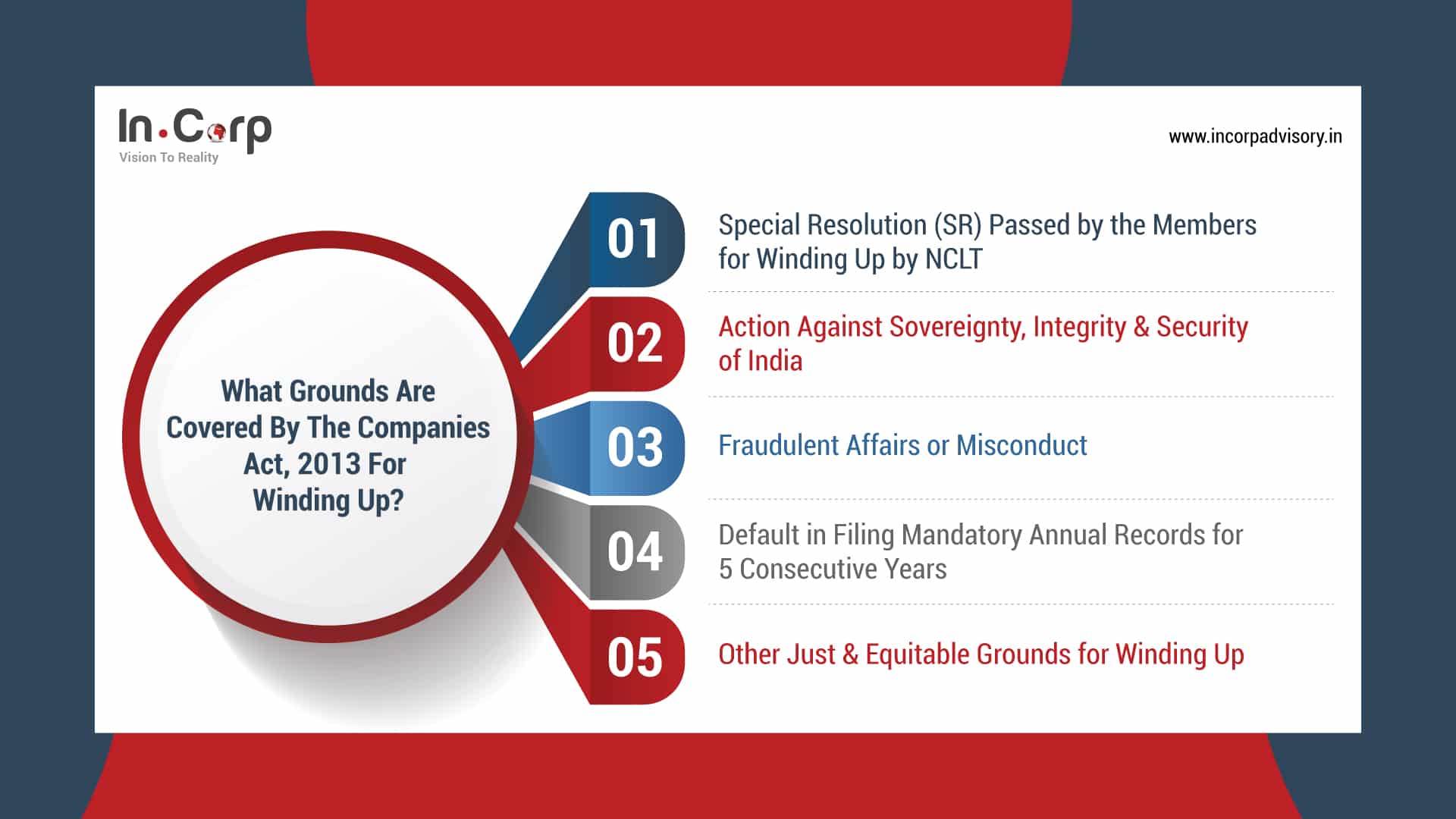In India, there are two ways in which a company may be liquidated: Compulsory and Voluntary.
Voluntary liquidation under IBC, 2016 allows corporate entities to liquidate themselves at will. Voluntary Liquidation provided under IBC, 2016, is a quick, efficient, a prescribed timely process which ensures that the assets of the Corporate Persons does not lose its value and involves speedy realization to the stakeholders.
Table Of Contents
Laws Governing Voluntary Liquidation Of A Company
What Is Voluntary Liquidation Under IBC, 2016
What Conditions Should A Corporate Person Meet To Start Voluntary Winding Up Of A Company
Effect
Voluntary Liquidation Process & Steps In A Nutshell
Conclusion
Why Choose Incorp?
FAQs On Voluntary Liquidation Under IBC 2016
Laws Governing Voluntary Liquidation of a Company
Section 255 in conjunction with Schedule XI of Insolvency and Bankruptcy Code, 2016 eliminates the need for Section 304 to 325 of The Companies Act, 2013. As a result, the Insolvency and Bankruptcy Board of India (Voluntary Liquidation Process) Regulations, 2017 were notified on 1st April 2017. Finally, Section 59 under Chapter V in IBC covers “Voluntary Liquidation procedures for Corporate Persons”.
This process is available to companies that have not committed any default and want to liquidate themselves. The Voluntary Liquidation provided under the Insolvency and Bankruptcy Code, 2016, is a quick, efficient, a prescribed timely process which ensures that the assets of the Corporate Persons does not lose its value and involves speedy realization to the stakeholders.
What is Voluntary Liquidation Under IBC, 2016
The Code mandates 3 (three) major conditions for a Corporate Person which intends to liquidate itself voluntarily:
- The Corporate Person has not committed any default
- Declaration from majority of Directors verified by an Affidavit that the Corporate Person has no debts or will be able to pay its debts in full from the proceeds of assets to be sold in the liquidation process and lastly,
- That the Corporate Person is not being liquidated to defraud any person.
Within 4 (four) weeks of the declaration specified in Point No. b hereinabove, majority of the Directors or Partners, as the case may be, shall pass a special resolution (SR) liquidating the Corporate Person and appoint an Insolvency Professional to act as the Liquidator.
Where the Corporate Person owes any debt to any person, creditors representing two-third (2/3rd) in value of the debts of the Corporate Person shall approve the special resolution (SR) passed by the Directors, Partners for liquidation of the Corporate Person.
Related Read: Winding Up Of A Company – IBC, 2016 Vs Companies Act, 2013
Effect:
Once the Liquidation is commenced, the corporate person shall cease to carry on its business, unless required for beneficial winding up of the Corporate Person and the corporate person shall continue until it is dissolved.
Voluntary Liquidation Process & Steps in a Nutshell
- Public Announcement by the Liquidation calling claims from creditors of the Corporate Persons
- Collation, Verification of the claims and thereby preparation of the list of Stakeholders by the Liquidator
- Liquidator to value and sell the assets of the Corporate Persons
- Liquidator to realize uncalled capital or unpaid capital contribution from any contributory to Corporate Person
- Liquidator to open a bank account in the name of Corporate Person followed by “in voluntary liquidation” for receipt of all monies due to the Corporate Person.
- Liquidator to distribute the proceeds from realization within 30 days from the receipt of the amount to the Stakeholders
- Liquidator to deduct the Liquidation Cost before distribution of the proceeds to Stakeholders
- An asset that cannot be sold readily due to its peculiar nature shall be distributed amongst the Stakeholders
- Various Reporting to National Company Law Tribunal by the Liquidator as per the prescribed timelines provided under the Liquidation Regulations:
- Preliminary Report
- List of Stakeholders
- Annual Status Report
- Minutes of consultations with Stakeholder
- Maintenance of Registers and Books of Accounts
- Maintenance of Receipts and Payments Account
- Final Report
- Liquidator to endeavor completion of Liquidation Process within 270 days from the Liquidation Commencement Date
- Once the affairs of the Corporate Person have been completely wound up and its assets are fully liquidated, then the Liquidator shall make an application along with the Final Report to the National Company Law Tribunal for dissolution of the Corporate Person.
- When the Hon’ble NCLT passes an order for Dissolution, the Corporate Person shall stand dissolved.
Related Read: What is Cross-Border Insolvency?
Conclusion
The lawmaker has made it easy for the promoters to arrive at a conclusive decision for moving towards ‘Voluntary Liquidation’ by way of examining on the major grounds laid down under the Code and has set up an easy route being streamlined for recovery to Stakeholders.
Some of the points to be checked before deciding upon the Law applicable are:
- Whether the entity has defaulted in repayment of debt?
- Whether the entity has sufficient assets to pay back their debt?
- Whether the creditors of the Corporate Persons shall approve the resolution for voluntary liquidation?
Why choose Incorp?
We at Incorp, have the expertise and skills to guide you and run the entire process of Voluntary Liquidation with experienced Insolvency Professionals and its team.
